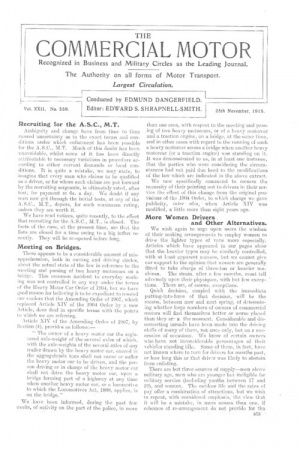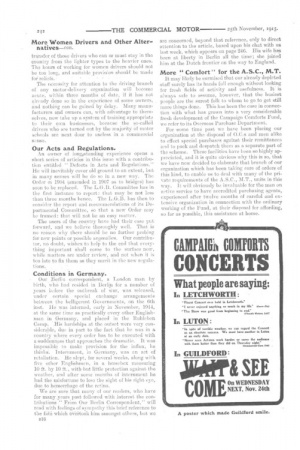Recruiting for the A.S.C., M.T.
Page 1

Page 2

If you've noticed an error in this article please click here to report it so we can fix it.
Ambiguity and change have from time to time caused uncertainty as to the exact terms and conditions under which enlistment has been possible for the A.S.C., M.T. Much of this doubt has been unavoidable, whilst some of it has been directly attributable to necessary variations in procedure according to either current demands or local conditions. It is quite a mistake, we may state, to imagine that every man who claims to be qualified as a driver, or for whom such claims are put forward by the recruiting sergeants, is ultimately rated, after test, for payment at Os. a day. We doubt if any men now get through the initial tests, at any of the A.S.C., 3.4.T., depots, for such maximum rating, unless they are worth it. • We have read notices, quite recently, to the effect that recruiting for the A.S.C., MT., is closed. The facts of the case, at the present time, are that the lists are closed for a time owing to a. big influx recently. They will be re-opened before long.
Meeting on Bridges.
There appears to be a considerable amount of misapprehension, both in owning and driving circles, about the actual state of the law in reference to the meeting and passing of two heavy motorcars on a bridge. This common incident to everyday working was not controlled in any way under the terms of the Heavy Motor Car Order of 1004, but we have good reason for believing it• to be expedient to remind our readers that the Amending Order of 1907, which replaced Article XIV of the 1904 Order by a new Article, does deal in specific terms with the points to which we are referring.
Article XIV of the Amending Order of 1907, by Section (4), provichs as follows:— " The owner of a heavy motor car the registered axle-weight of the several axles of which, with the axle-weights of the several axles of any trailer drawn by the heavy motor car, exceed in the aggregatc7fsix tons shall not cause or suffer the heavy motor car to be driven, and the person driving or in charge of the heavy motor car shall not drive the heavy motor car, upon a bridge forming part of a highway at any time when another heavy motor car, or a locomotive to which the Locomotives Act,. 1898, applies, is on the bridge."
• We have been informed, during the past few weeks, of activity on the part of the police, in more than one area, with respect to the meeting and passing of two heavy motorcars, or of a heavy motorcar and a traction engine, on a bridge, at the same time, • and in other cases with regard to the running of such a heavy motorcar across a bridge when another heavy motorcar (or a traction engine) was standing on it. It was demonstrated to us, in at least one instance, that the parties who were considering the circumstances had not paid due heed to the modifications of the law which are indicated in the above extract.
We now specifically commend to owners the necessity of their pointing out to drivers in their service the effect of this change from the original proVisions of the 1904 Order, to which change we gave publicity, inter al/a, • when Article XIV was modified, a little more than eight years ago.
More Women Drivers.
and Other Alternatives.
We wish again to urge upon users the wisdom of their making arrangements to employ women to drive the lighter types of vans more especially. Articles which have appeared in our pages show that the heavier types may be similarly controlled, with at least apparent success, but we cannot give our support to the opinion that women are generally. fitted to take charge. of three-ton or heavier mas chines. The strain: after a few months, must tell adversely upon their physiques, with but few exceptions. There are, of course, exceptions. '
Quick decision, coupled with the immediate putting-into-force of that decision, will be the means, between now and, next spring, of determining whether large numbers of owners of commercial motors will find themselves better or worse placed than they are a the moment. Considerable and disconcerting inroads have been made into the driving stafis of many of them, not once only, but on a succession of occasions. We know of certain owners who have not inconsiderable percentages of their vehicles standing idle. Some. of them, in fact, have not known where to turn for drivers for months past,. or how long this or that driver was likely to abstain from enlisting.
There are but three sources of supply—men above military age, men who are younger but ineligible for military service (including youths between 17 and 19), and women. The outdoor life and the rates of paY offer a combination of attractions, but we wish to repeat, with considered emphasis, the view that it will be a mistake, in more senses than one, if schemes of re-arrangement do not provide for the transfer of those drivers who can or must stay in the Country from the lighter types to the heavier ones. The hours of working for women drivers should not be too long, .and euitable.prov.ifion should be made for reliefs. • The necessity for attention to the driving branch of any motor-delivery organization will become acute, within three months of date, if it has not already done so in the experience of, some owner, and nothing can be gained by delay. Many manufacturers and owners can, with advantage to themselves, newt eke up a system of training .appropriate to their own businesses, because the so-called drivers who are turned out by the majority of motor schools are next doorto useless in a commercial sense.
Our Acts and Regulations, .
An owner of longostanding experience opens a short series of articles in this issue with a contribution entitled " Defects in Acts and Regulations." He will inevitably cover old ground to an extent, but in many senses will he do so in a new way. The Order en 1904 (emended in 1907 as to bridges) has soon to be replaced. The L.G.B. Committee has in the first instance to report: that may be not less than three months hence. The L.G.B. has then to consider the report and recommendations of its Departmental. Committee, so that 4. new Order may be framed: that will not be an easy matter.
The users of the country have had their case put forward., and we believe thoroughly well. That is no season why there should be no further probing for new points or possible anomalies. Our contributor, no doubt, wishes to help to the end that everything important shall come to the surface now, while matters are under review, and not when it is too late to fix them as they merit in the new regulations.. .
Conditions in Germany.
Our Berlin correspondent, a London man by birth, who hod resided in Berlin for a number of years before the outbreak of War, was released, under certain special exchange arrangements between the belligerent Governments, on the 6th inst. lie was interned, early in November, 1914, at the seine time as practically every other Englishman in Germany, and placed in the Ruhleben Camp.. His hardships at the outset were very considerable, due in part to the fact that he was in a country where every order has to be executed with a suddenness that appeoaches the dramatic. It was impcssible to make provision for the influx, he thinks. Internment, in Germany, was an act of retaliation. He slept, for several weeks, along with five other Englishmen, in a horsebox measuring 10 ft. by 10 ft., with-but little protection against the weather, and after some 'months of internment he had the misfortune to lose the sight of his right eye, due to hemorrhage of the retina.. We are sure, that many of our readers, who have for many;years past followed with interest the contrihntione ." From Our Berlin Correspondent," will road with feelings of sympathy this brief reference to the fatewhich •oV'ertoOk him amongst others, but we
BIG
are concerned, beyond that reference, only to direct attention to the article, based upon his chat with us last week, which appears on page 246. His wife haS been at liberty in Berlin all the time'; she joined him at the Dutch frontier on the way to England. •
More " Comfort " for the A.S.C.,
It may likely be surmised that our already depleted staff surely has its hands full enough without looking for fresh fields of activity and usefulness. It' is always safe to assume, however, that the busiest people are the surest folk to whom to go. to get still more things done. This has been the ease in connection with what has grown into a very considerable freshdevelopment of the Campaign Comforts Fund, we refer to its Overseas Purchase Department.
For some time past we have been placing our organization at the disposal of O.C.s and men alike to effect special .purchases against their remittances and to pack and despatch them as a separate part of the scheme. These facilities have been so highly appreciated, and it is quite obvious why this is so, that We have now decided to elaborate that branch of our organization which has been taking care of orders of this kind, to enable us to deal with many of the private requirements of the A.S.C., M.T., units in this way. It will obviously be invaluable for the men on active service to have accredited purchasing agents, experienced after twelve months of careful and ex-tensive organization in connection with the ordinary working of the Fund, at their disposal for affording, so far as possible, this assistance at home.




















